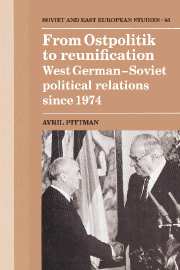
- Publisher:
- Cambridge University Press
- Online publication date:
- October 2009
- Print publication year:
- 1992
- Online ISBN:
- 9780511562938

With the signing of the Moscow Treaty in 1970, West German-Soviet relations came to the forefront of world politics. Two decades later, the historic opening of the Berlin Wall and German reunification once again focused world attention on the Federal Republic's relations with the USSR. This book explores the development of this relationship from the perspective of West Germany. Dr Avril Pittman outlines the main events after the Second World War and then focuses on four issues central to this relationship in the 1970s and early 1980s. She explores family reunification and emigration rights for ethnic Germans living in the Soviet Union; the central role of Berlin and the reasons why the city persisted as a serious bilateral problem; the triangular relations between West Germany, the Soviet Union and East Germany; and the significance of the Soviet intervention in Afghanistan which led to a sharp deterioration in East-West relations.
"This book should interest specialists and students of German and Soviet foreign policy as well as students of international relations." Ieuan G. John, Times Higher Education Supplement
"The book's major strength is the empirical discussion of Schmidt's Ostpolitik and its four central concerns: the situation of ethnic Germans, the status of Berlin, West Germany's relationship with East Germany and the twin impact of the decision to deploy American intermediate-range weapons in Germany and the Soviet invasion of Afghanistan on FRG-Soviet ties." Angela Stent, Slavic Review
 Loading metrics...
Loading metrics...
* Views captured on Cambridge Core between #date#. This data will be updated every 24 hours.
Usage data cannot currently be displayed.